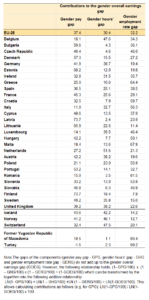An algorithm is as clever as the person who developed it. Therefore, if a machine is going to learn by itself, what at the beginning is just a small error could become very soon an enormous one.
Due to the increase role new technologies (notably the ones using AI or ML) are having in todays society, even in sectors or areas as legal judgment and social affairs – where a context analysis should be mandatory – it would be very interesting to understand how gender biases are assessed.
The inner danger of these new technologies is that they could worse the stereotypes perception in their negative sense because they are developed by human beings.
I could refer, to stay in the media sector for instance, on how posts appears on social medias, how they analyze our reactions and behavior in order to, at a certain point, better know our inner thoughts than ourselves.
Because, if “human kind cannot bear very much reality” (I do not know what the author meant with the word reality, but I will refer to it – in this proper context – as “given and assumed datas – dogma”), certainly a computer can, and it can go very very far with it as well. What will then the consequences be? What for the price?





